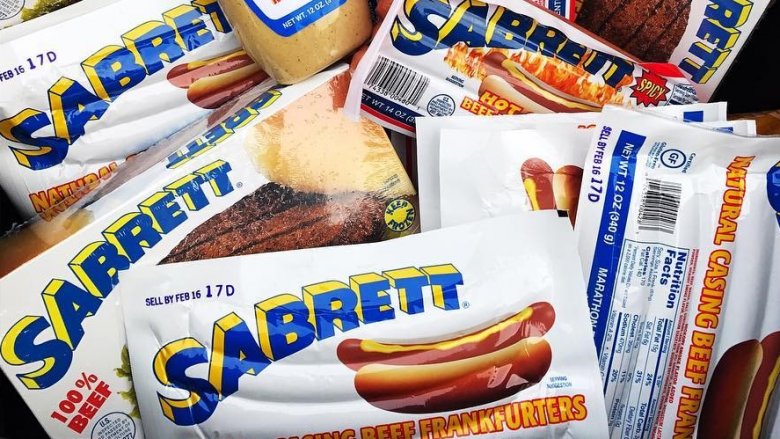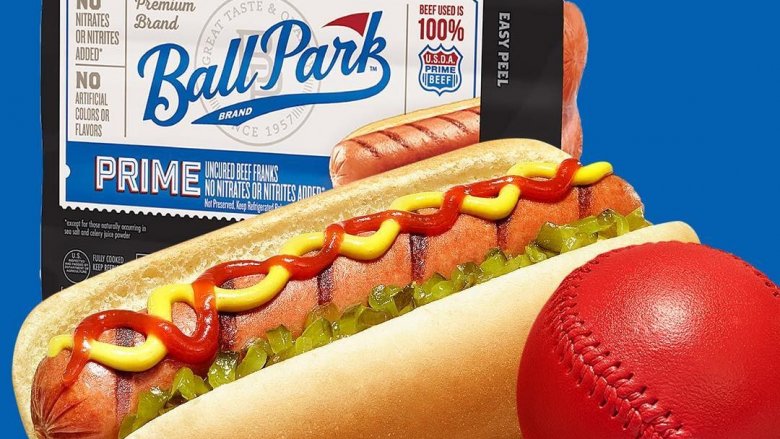Hot Dogs You Should And Shouldn't Buy
There's something quintessentially American about hot dogs. At best, they're a staple of long, lazy summer days and at worst, they're suspicious tubes of mystery meat in a casing you probably don't want to ask too many questions about.
The nature of hot dogs means there are a lot of stories about what, exactly, is in them. It's nothing new, and it's not going to stop any time soon, either. Snopes says in 2017, a fake news story from World News Daily Report started making rounds on the internet, claiming a hot dog vendor in New York City had been caught using meat from real dogs for the dogs he was selling on the street. It was a completely false news story, but the idea that there's good hot dogs and very, very bad hot dogs is still pretty accurate.
Mystery meat aside, there are definitely some hot dogs that'll be a hit when they come off any grill, and some you should probably avoid. Let's talk hot dogs, and the ones you should — and shouldn't — pick up this summer.
Should: Nathan's Famous
If you're looking for a delicious dog with a more than a little history and some serious Americana cred, look no further than Nathan's Famous. Nathan was a very real person named Nathan Handwerker, and his hot dogs shot to fame after he staged a Fourth of July hot-dog eating contest in 1916. The event became an annual one, and the Smithsonian says the popularity of the Polish immigrant's five cent frankfurters skyrocketed from there.
Even at the turn of the century, people were pretty suspicious of hot dogs. Handwerker even hired men and dressed them as doctors to convince the public his dogs were healthy, and it worked.
And they're still the same dogs you get today. Thrillist says the recipe isn't just called "original," it really is. It hasn't changed since 1916 since Nathan himself developed the recipe, so if you want some great dogs with a ton of history and some classic Americana, you can't go wrong with Nathan's.
Should: Sabrett
Gluten-free hot dogs might seem like a bit of an odd thing to talk about, but for those diagnosed with celiac disease, it's a huge deal. When VeryWell Fit put gluten-free hot dogs under the spotlight, they found that they're not all created equal.
According to the FDA, hot dogs can be labeled gluten-free if their gluten content is less than 20 parts per million. There are a number of brands that meet the criteria, and more who don't. Many — like popular Hebrew National — can be considered to contain no gluten, but at the same time, they're not gluten-free. That happens when they're prepared in a facility where gluten cross-contamination is a possibility, and that brings us to Sabrett. They're one of the few hot dog manufacturers that have a gluten-free certification from the Gluten-Free Certification Organization, and they go beyond what the FDA requires. Their gluten content is less than 10 parts per million, so if you're looking for something you can serve safely, Sabrett is it.
Should: Applegate Farms
By now, everyone has heard about the World Health Organization's declaration that processed meats were classified as a group one carcinogen. Part of the problem with these types of meats is the nitrate and nitrite content. According to The Guardian, the official ruling is that problem meats are generally those that have been salted and cured — like most hot dogs — and that's where Applegate Farms hot dogs come in.
Fox News named them as the best all-beef hot dogs you can buy, for a few reasons. They're uncured, which means they don't have any added nitrates or nitrites, which are usually added to cured meats to help with the preservation process. They're also fairly low in sodium (for hot dogs), with only 330 mg per dog. Calorie-counters won't be too offended either, as they clock in at just 110 calories per dog.
They also go above and beyond industry standards when it comes to animal welfare, using only animals raised with no antibiotics, no crates, plenty of space, and no painful alterations to teeth, tails, toes, and beaks.
Should: Boar's Head Lite
When Berkeley Wellness took a shot at finding a healthier hot dog, they found it was challenging at best. Hot dogs definitely aren't a health food, but you should be able to eat a couple without ruining your day or your diet, right?
One of the healthiest options they found was Boar's Head Lite Beef Frankfurters, a 90-calorie dog that only contains 6 grams of fat and 270 mg of sodium. That might not sound horribly healthy, but many of the popular brands of hot dogs will provide you with a few days' worth of calories and sodium in a single meal.
There's another bonus to these, too. If the idea of that mechanically-separated meat makes you squirm a bit, Insider reports Boar's Head only uses whole-muscle meats. That should make almost anyone feel better about serving up a platter of hot dogs.
Should: Trader Joe's Uncured Chicken Dogs
There's another super-healthy option buried among the many, many different kinds of hot dogs, and it's made by Trader Joe's. Their All Natural Uncured Chicken Hot Dogs were named the best chicken dog by Health, and it's no wonder: They only contain 60 calories, 250 mg of sodium, and 2.5 grams of fat. They also come with a decent amount of protein — 9 grams — and no mystery meat, just chicken. (And no, not all chicken dogs are created equal: Rocky's has five times the fat and twice the sodium!)
If you're looking for another reason to try chicken hot dogs, the Environmental Working Group has it. They looked at the total greenhouse gas emissions for all different kinds of food, and found that while lamb, beef, and pork were pretty high on the charts, chicken ended up being the most efficient meat and the best for the planet. Go green, grab some chicken dogs!
Shouldn't: Ball Park
It's all right if you grew up on Ball Park franks, they're a popular brand. But you're an adult now and you know better, so let's look at just how bad these are for you. Berkeley Wellness listed them as one of the hot dogs you should absolutely pass on, because not only are they 190 calories and 16 grams of fat each, but each one contains between a quarter and a third of your entire daily recommendation for sodium. The American Heart Association recommends you try to limit yourself to around 1,500 mg a day, and that's made even harder when you consider each Ball Park frank has around 550 mg — before toppings.
That's just for the standard, regular-size dogs, so you can just imagine what you're getting in the jumbo dogs. Curious? A single Grillmaster dog clocks in at 260 calories, 24 grams of fat, and 780 mg of sodium. Even their Lean dogs aren't incredibly friendly when it comes to sodium — they contain 480 mg — so maybe just skip the old favorites and try something new.
Shouldn't: Oscar Mayer Turkey Dogs
These make the "bad" list not just because they're bad for you, but because they're masquerading as being good. You'll probably glance at them, think the lower-fat turkey hot dogs are a good idea, and that's all the farther you'll go. But they're fairly high-calorie (having 100 calories each), and they're high in fat and sodium, too. With 8 grams of fat and 510 mg of sodium (via CBS News), these definitely aren't a healthy grill option.
Oscar Mayer's Light Wieners (made with turkey and pork) get an honorable mention here, too. Even though they boast they contain less fat and calories than their heftier cousins, they're still going to set your diet back in a pretty impressive way with 6 grams of fat each. And in case that tempts you to have an extra one, you should also know each one has 380 mg of sodium (via CBS News). That adds up very, very fast.
Shouldn't: Vegetarian hot dogs
This one's a little different, because it's a problem that's so widespread across all different brands of veggie dogs that it's worth talking about. People have different reasons for becoming vegetarian, and if you think a vegetarian hot dog is a good idea for any of your meat-free friends and family, there's a good chance you're mistaken.
In 2015, Clear Food did a deep-dive into just what's in a hot dog, and looked at the genome sequences from 75 different brands of hot dogs. They found (via USA Today) that 14 percent of them didn't contain what the package claimed — and that included veggie dogs.
Ten percent of hot dogs labeled as vegetarian contained meat products of some sort, and that means there's pretty good odds you're getting meat in your veggie dog. The report didn't name the brands, and instead, they suggested it's a widespread problem across the industry. (In all fairness, Hebrew National, Butterball, Eckrich, and McCormick brands were found to be among the most honest when it came to matching contents and packaging.)
Shouldn't: Pork-free hot dogs
Clear Food's 2015 hot dog testing found another disturbing trend, one that seems to suggest that sometimes, food myths are there for a reason. Hot dogs have always had a reputation as being mystery meat, and they found that a lot of the time, we absolutely don't know what's in them.
There are a huge number of people who avoid pork products, and you'd hope labels like "Kosher" and "Halal" reflect what's in the dog. Clear Food found (via Apollo Hospitals) that's not always true, and that three percent of their sample group was made up of hot dogs that swapped in pork as a substitution for chicken or turkey. Worse, some of them were still labeled as Kosher and Halal.
If you're avoiding pork for any reason, you might want to think twice about pork-free hot dogs. They might not contain what you think they contain.
Shouldn't: Morning Star Corn Dogs
Who doesn't love a corn dog? They come with an extra dose of nostalgia and that's great, but Morning Star's vegetarian corn dogs come with a whole bunch of other stuff, too.
First, let's point out that since they're vegetarian, it's our default setting to believe they're going to be better for us than a meat-filled dog. That's not entirely true, especially when it's a corn dog! These clock in at 150 calories each (which isn't terrible, for a corn dog), but they also have a pretty shocking 470 mg of sodium. To recap, that's around a third of what you should be eating for the entire day, all on a single stick (via CBS News).
There's another problem here, too. Not only are they full of fillers, extenders, and ingredients designed to mimic the texture of meat, they're so heavily processed those vegetarian ingredients aren't even recognizable anymore.









